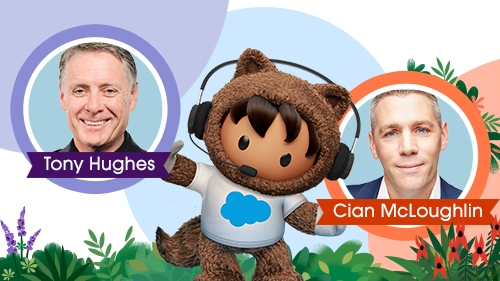What gives sales teams the best advantage? Two experts weigh in



There’s no magic formula for the sales process, but there are some things sales teams can focus on to increase their chances of success. Sales heavyweights Tony Hughes and Cian McLoughlin are back for another friendly debate about what sales teams should focus on to stand out from the crowd.
In our first post in this series, sales experts Tony Hughes and Cian McLoughlin debated whether the open or the close was the most important part of the sales process (catch up on that post here). Now these heavyweights are back for round two!
Tony and Cian sat down to give their take on the factors they feel have the biggest influence on customer decision-making.
But before we get where they differ, let’s start with what they do agree on: price should not be a differentiator.
“If there’s nothing else I can give you, I have to find a way to sharpen the pencil. But if I’ve done my work around discovery and understanding what you really need, then I’ve got a lot of other ways to add value other than a discount,” Cian says.
“Exactly – we all need to think like a CEO,” Tony says, adding: “a 5% discount in price can result in a 35% reduction in profit for the business. You need to leave yourself room to negotiate, but just remember price is not the big point of difference.”
Why else is focusing on price not a great idea? Watch more:
Cian McLoughlin: People and purpose are your biggest advantage
The quality of our product and our process, and even the price point are all really, really important up to a certain stage – but that only gets us to the shortlist. And then customers are looking for: Who are we engaging with? Do we trust them? Can they challenge us? Can they bring insight? What are they going to be like when the proverbial hits the fan? Who else has worked with them that we know can vouch for them?
And then the other component part is, what do they stand for as an organisation, as individuals, and do we align with that?
Especially in B2B, where it’s multiple touchpoints in a sales cycle, over an extended period, the quality of the human-to-human interaction is really important. It’s the price of doing business now to create a good customer experience. But as the deal value increases, as the complexity increases, that’s where the organisation’s people and the purpose are crucial.
If you want to win the deal, and ultimately that’s what we’re all about, there’s all of these other factors that relate to the quality of the people and the quality of the purpose of the organisation that will get you over the line.
If it is just virtue signalling, then we can smell it 100 yards away. But if it isn’t, if we deliver on that promise, if it’s not just a mission statement on a wall, then that brings in great talent, it brings in great customers, great partners. And that creates long-term value, rather than that short-term focus on, “Are we going to hit our numbers this quarter?”
So while I think process is important, sales teams need to look for ways to make that process feel human, tailored, relevant and unique for the customer. And that’s going to give them the best shot of winning – those little moments of surprise and delight and differentiation.
Tony Hughes: Process is what creates the best experience
The buyer’s journey almost never starts with them talking to a seller. The buyer’s journey starts within their own trusted network and – more typically these days – online. Therefore, we need to move a client or customer through a journey that aligns their buying process with our sales process. It’s all about delivering a great customer experience all through that whole process – from marketing through to selling, onboarding, servicing and renewing.
You need to apply this to your own context, but here’s the reality for me: I think about selecting the bank that’s going to look after me. I actually don’t care that much about their people and purpose. What I want is just a great experience that gives me time back, gives me control and makes my life easy.
I find a lot of the attempts of businesses to project their purpose is just a whole bunch of virtue signalling that often just doesn’t land. It becomes all about them and their purpose and their mission. And what I believe is to really up the win rates in selling and be truly successful, that purpose needs to be all about the customer.
We’re all about making a positive difference in the lives of our customers, personally, professionally. That’s really a purpose – not the mission statements that many organisations come out with. Intent is really key, and a lot of sellers just inadvertently convey the wrong intent.
If we focus on ourselves, we create comparisons. We get questions about price. It becomes much harder to recover. You’ll get made a commodity in the mind of the buyer.
Creating a great process, a great customer experience, should start with sellers interviewing their best customers to learn what triggered them going down the path that eventually led to your business. What was the business case they put up internally to justify the investment? What results did you promise? Did we deliver on this together? If not, how can we work together to make sure that we do?
This shows customer-centricity with intent. And if you use that to inform the way that you sell, that’s how you create a process that truly aligns.
What are the biggest factors influencing the sales profession in Australia and New Zealand right now? Check out our Trends in ANZ Sales Report for more insights into the future of the profession.



















